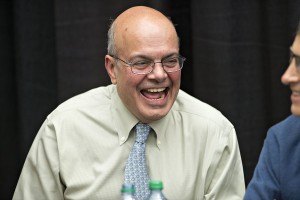Warren Buffett didn’t spill the beans about his already-chosen successor in his latest annual letter to Berkshire Hathaway shareholders. Long-time vice-chairman Charlie Munger fueled continued speculation, however, that it will either be Ajit Jain or Greg Abel.

Photographer: Daniel Acker/Bloomberg
Jain runs Berkshire Hathaway’s reinsurance operations and Abel is the chief executive of Berkshire Hathaway Energy. Both have been rumored to be possible successors to Buffett as CEO if or when he chooses to retire, and Munger mentioned each in his own comments included in the Feb. 27 shareholder letter.
Munger in speculating about what would happen if Buffett were to leave soon, wrote that Jain and Abel are “proven performers,” and “world-leading” executives, adding that each is “a better business executive than Buffett” who appears loyal and would remain with Berkshire and keep the conglomerate on its existing pathway. (See also, related article, “Buffett, Munger on Leadership, Success in Business.)
In his broader remarks about Berkshire Hathaway’s performance, Buffett offered a particular shout-out for Jain.
“Ajit’s underwriting skills are unmatched,” Buffett wrote. “His mind, moreover, is an idea factory that is always looking for more lines of business he can add to his current assortment.”
Buffett, who is now in his early 80s, remains coy in his own remarks about who will replace him, something that has worried investors in the past. Last May, Buffett announced that directors had chosen his eventual replacement and two backups, but that their names would stay secret. Buffett, in his new remarks to shareholders, wrote at length about the kind of replacement CEO Berkshire Hathaway wants and will be getting when the time comes.
“The board and I believe we now have the right person to succeed me as CEO—a successor ready to assume the job the day after I die or step down,” Buffett wrote in his 2014 annual letter. “In certain respects, this person will do a better job than I am doing.”
For a Berkshire Hathaway CEO, character is crucial, Buffett said. He also emphasized that the new leader should not be driven by “ego” or “avarice” to “reach for pay matching his most lavishly-compensated peers, even if his achievements far exceed theirs.”
He cautioned that a CEO’s behavior sets the tone for managers at all levels, noting that “if it’s clear to them that shareholders’ interests are paramount to him, they will, with few exceptions, also embrace that way of thinking.”
Buffett said his successor will need the ability to “fight off the ABC’s of business decay, which are arrogance, bureaucracy and complacency.”
“When these corporate cancers metastasize, even the strongest of companies can falter,” Buffett wrote, adding that “only a vigilant and determined CEO can ward off such debilitating forces as Berkshire grows even larger.”
Buffett said that Berkshire Hathaway’s corporate structure will help future CEOs be successful, thanks in part to “the extraordinary delegation of authority” that the company now has.
“Berkshire is not a giant company but rather a collection of large companies,” Buffett explained.
He said that future CEOs should come from internal candidates that the Berkshire Hathaway board has gotten to know well over time. Also, a new CEO should be relatively young when he or she starts, in order to ensure a long tenure.
“Berkshire will operate best if its CEOs average well over ten years at the helm. (It’s hard to teach a new dog old tricks.),” Buffett said. “And they are not likely to retire at 65 either (or haven you noticed?).”
As well, Buffett reiterated his recommendation for his son, Howard, to succeed him as a non-executive chairman in an unpaid position at which he will work as required by the directors.
“My only reason for this wish is to make change easier if the wrong CEO should ever be employed and there occurs a need for the chairman to move forcefully,” Buffett said. “I can assure you this problem has a very low probability of arising at Berkshire—likely as low as at any public company.”





















 How Americans Are Using AI at Work: Gallup Poll
How Americans Are Using AI at Work: Gallup Poll  Preparing for an AI Native Future
Preparing for an AI Native Future  Flood Risk Misconceptions Drive Underinsurance: Chubb
Flood Risk Misconceptions Drive Underinsurance: Chubb  Beazley Agrees to Zurich’s Sweetened £8 Billion Takeover Bid
Beazley Agrees to Zurich’s Sweetened £8 Billion Takeover Bid 













